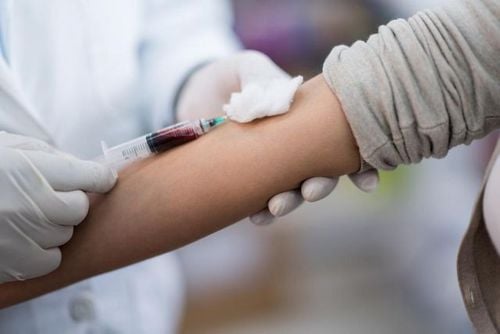This is an automatically translated article.
During pregnancy, a woman needs to understand what a blood lead test is, what a urine lead test is as well as perform the above tests to promptly detect and prevent effects on the fetus.
1. Why should you do a lead test in pregnant women?
According to research, lead is a heavy metal, with many toxicity, can cause damage to the body, especially the brain. The ways in which people are exposed to lead and the causes of lead poisoning are by eating and drinking lead-contaminated foods, inhaling lead-containing dust or fumes, direct contact with lead through the skin... All ages Both are susceptible to lead exposure and poisoning, but for children under 6 years of age, the level of health hazard is more severe because lead has long-term and lifelong effects on a child's growth and development in the future. future.
Another subject that also needs to pay attention to lead poisoning is pregnant women. The mechanism of lead poisoning and its effect on the fetus is explained as follows: lead can be contaminated into the mother's body, then passed to the fetus, possibly through breast milk. Therefore, in order to check the lead status of pregnant women's bodies, a lead test is extremely necessary, not only to check the mother's health but also to protect the healthy developing fetus. In addition, when testing for lead, besides finding the cause of lead poisoning, it also helps to assess whether the treatment for lead poisoning is effective or not.

Xét nghiệm chì ở mẹ bầu
2. What is a blood lead test?
Blood lead test is a type of laboratory test that aims to measure the concentration of lead in the blood. A blood lead test can be done by taking a blood sample from a vein, finger, heel:
Blood sample from a vein: Taking blood from a vein, usually in the arm. This procedure may cause minor bruising at the site of the blood draw or slight swelling after the blood is drawn. Blood sample from the heel: Take a few drops of blood from the patient's heel, note that it is still necessary to clean the heel skin with alcohol, then use a small sterile lancet to collect blood. This technique of drawing blood needs to be done carefully and with care so as not to contaminate the blood. In the event that a blood sample taken from the patient's heel is positive for lead, a lead test with blood taken from a vein will be ordered to confirm the results.
With lead blood test results, if the lead level is 10 mcg/dL or higher, some other tests will be ordered to confirm the diagnosis of lead poisoning. To assess the degree of lead poisoning, there are 5 levels of lead poisoning in the blood as follows:
Level 1: 1-9 mcg/dL or less 0.48 Level 2A: 10-14 mcg/dL or 0.48- - 0.68 mcmol/L. Level 2B: 150 19 mcg/dL or 0.7-0.96 mcmol/L Level 3: 20-44 mcg/dL or 0.97-2.1 mcmol/L Level 4: 45-69 mcg/dL or 2.17-3.33 mcmol/L Level 5: greater than 69 mcg/dL or greater than 3.33 mcmol/L In cases of skin contamination, the lead test cannot be performed, or if the test is performed, the results will be invalid. When being examined, patients need to clearly state their existing diseases as well as their medical history so that doctors can make appropriate indications.

Lấy mẫu máu từ tĩnh mạch
3. What is a urine lead test?
Similar to a blood lead test, a urine lead test is a measure to assess the lead concentration in the urine of a patient. Some notes when testing for lead in the urine is that it is necessary to take samples and test at the time specified by the doctor for the most accurate test results as well as to be able to monitor the treatment process. Is it possible to remove lead from the body or not, is the lead detoxification method appropriate?
In cases where the skin is contaminated, the lead test cannot be performed, or if the test is conducted, the results will be invalid, so when the patient is examined, it is necessary to specify the existing diseases as well as your medical history so that the doctor can make appropriate indications.
Understanding why it is necessary to do a lead test in pregnant women is a very important knowledge because if the test is delayed, the mother has severe lead poisoning, there is a risk of transmission to the fetus, causing adverse effects on the fetus. later fetal development. Therefore, pregnant women and their families need to learn what a blood lead test is as well as a urine lead test to protect the health of both mother and baby.

Xét nghiệm chì trong nước tiểu
At Vinmec International General Hospital, there is a package maternity service as a solution to help pregnant women feel secure because of the companionship of the medical team throughout the pregnancy. When choosing Maternity Package, pregnant women can:
The pregnancy process is monitored by a team of qualified doctors Regular check-up, early detection of abnormalities Maternity package helps to facilitate the process. birthing process Newborns get comprehensive care
Please dial HOTLINE for more information or register for an appointment HERE. Download MyVinmec app to make appointments faster and to manage your bookings easily.
LEARN MORE
Prenatal genetic screening test: What you need to know 7 prenatal diagnostic measures to help detect fetal malformations The best time to do a chorionic villus biopsy













